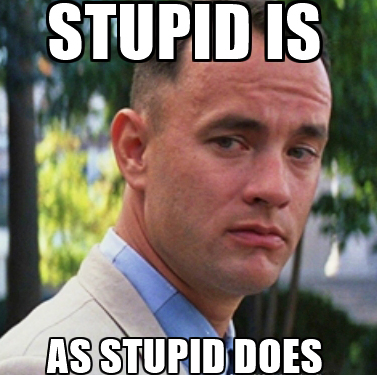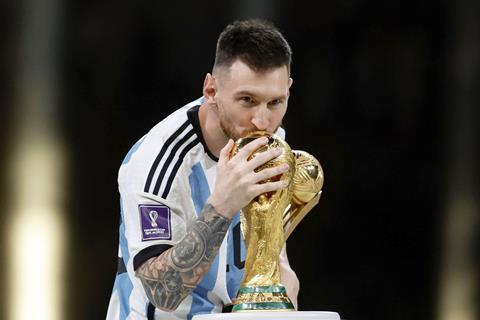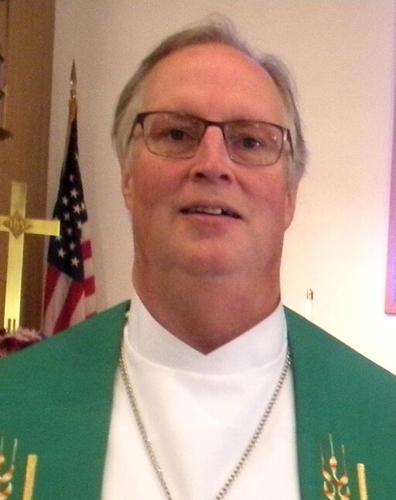It is “Pray for Revival!” Recently, I have devoted more to that site for a couple of reasons:
1) Our nation is great need for revival.
2) The current revival at Asbury University in Wilmore, KY. May it spill over to the rest of America and beyond.

Can Dietrich Bonhoeffer make a difference on the lives of twenty-first century Christians?
It is “Pray for Revival!” Recently, I have devoted more to that site for a couple of reasons:
1) Our nation is great need for revival.
2) The current revival at Asbury University in Wilmore, KY. May it spill over to the rest of America and beyond.
You want them at your table, but stupid players are a lot more unpredictable and should be approached with caution.

One of the real gifts poker has given me is that it has been a great jumping off point to learn things from other disciplines like economics, AI, psychology and Game Theory. So here is a series of articles where I bring some of the most interesting things I have learned from other subjects outside of poker which are applicable in this game we know and love.
Dietrich Bonhoeffer was a German theologian and pastor who is known for his contributions to theology and his resistance to the Nazi regime during World War II. Bonhoeffer developed a theory of stupidity that he referred to as “stupidity as sin.”
According to Dietrich Bonhoeffer, stupidity can be more dangerous than evil because it is harder to defend against. While it is possible to take action against evil individuals, those who are stupid may not be receptive to reasoning and may ignore any attempts to protest or fight against them. As a result, people who are caught up in their own narrow perspectives and refuse to consider alternative viewpoints can be particularly difficult to oppose.
Against stupidity we have no defense. Neither protests nor force can touch it. Reasoning is of no use. Facts that contradict personal prejudices can simply be disbelieved — indeed, the fool can counter by criticizing them, and if they are undeniable, they can just be pushed aside as trivial exceptions. So the fool, as distinct from the scoundrel, is completely self-satisfied. In fact, they can easily become dangerous, as it does not take much to make them aggressive. For that reason, greater caution is called for than with a malicious one. Never again will we try to persuade the stupid person with reasons, for it is senseless and dangerous. — Dietrich Bonhoeffer
Bonhoeffer argued that it was stupidity that led to the rise of Hitler. In modern times some of the extreme responses to COVID and climate change, or some of the more bizarre election results, could easily fall into this rubric.

Obviously the examples above are all incredibly serious with potentially grave consequences. Not to trivialise those, there is an obvious poker parallel to be made, which is that stupid players are in some ways harder to play against.
You can predict what a weak regular is going to do and usually put them on a reliable range of hands. In a 3-bet pot on a 2-7-K flop you don’t really have to worry about them having bottom two pair, for example. Against a complete donkey, however, nothing is out of the question.
We must stand up to, and speak out against, Christian nationalism, especially when it inspires acts of violence and intimidation.
By Dr. Ellen Kennedy, the Rev. John Matthews & the Rev. James Erlandson

Sophie Scholl was beheaded by guillotine in Munich, Germany at the age of 21.
Her crime? Speaking out against the Aryan white supremacy of the Nazi regime.
It was 1943. Sophie was a member of the White Rose, a clandestine group of university students who were distributing leaflets at universities throughout Germany urging resistance to the Third Reich.
A janitor saw Sophie dropping leaflets off a balcony railing into a central hallway at the University of Munich, and he turned her in to the Gestapo. She was arrested, imprisoned, beaten, and murdered four days later.
After the execution, a pro-Nazi rally was held at the university, and the janitor was given a standing ovation.
“Such a fine, sunny day, and I have to go,” Sophie said, before she was guillotined. “But what does my death matter, if through us thousands of people are awakened and stirred to action?”
Dietrich Bonhoeffer was a Lutheran pastor and theologian who became a leader in what was known as the Confessing Church, which opposed German Christian policies of exclusion and marginalization. He was involved in a conspiracy to assassinate Hitler that culminated in a failed coup on July 20, 1944. As a consequence, he was imprisoned for two years and sentenced to death at a court-martial in Flossenbürg concentration camp in Germany.
On April 9, 1945, he was led naked into the execution yard and hanged. His crime? He would not subvert Christianity to a religion that put Hitler ahead of God. He believed that the German Protestant church failed to stand up against the evils of Nazism and he stood in solidarity with the victims.
Sophie Scholl and Dietrich Bonhoeffer have become heroes in the pantheon of “upstanders” against the Christian nationalism of Nazi Germany.
What is Christian nationalism?
As Georgetown University political science professor Paul D. Miller described in Christianity Today, “Christian nationalism is the belief that the American nation is defined by Christianity, and that the government should take active steps to keep it that way. Christian Nationalists assert that America is and must remain a ‘Christian nation’ – not merely as an observation about American history, but as a prescriptive program for what America must continue to be in the future.”
We’ve all seen T-shirts proclaiming, “Jesus Christ is my savior and Donald Trump is my president.” This is an example of Christian nationalism.
By Burt Baldwin, Ignacio
When I attended seminary many years ago, I was struck by the works of Dietrich Bonhoeffer. Reverend Bonhoeffer was a German Lutheran minister, theologian and activist. He is best known for his work, “The Cost of Discipleship,” which was published in the 1930s. Dietrich was known for his staunch resistance to the Nazi dictatorship and Adolf Hitler. He spoke, without fear, against the regime’s euthanasia program and the persecution of the Jews.
As a result, he was imprisoned in April 1943. He was sent to Tegel Prison, and later, transferred to the Flossenburg concentration camp.
Nearly a month before the liberation of Europe, in April 1945, Dietrich was accused in the conspiracy to assassinate Adolf Hitler, which was known as the “July 20 Plot.” Less than a month before the end of the war, Bonhoeffer was stripped of his clothes, ordered up to the gallows and hung.
Dietrich was one of the few people who could see what fascism was doing to his country. He witnessed the destruction of Jewish cemeteries and the rampaging of Jewish businesses during the riots of “Kristallnact,” also known as the night of the broken glass. He watched as Jewish citizens were harassed, beaten and raped. Synagogues were burned. Jews had to register their businesses, which were later confiscated. Jewish professors were banned from universities. Jewish children were ordered to attend only Jewish schools. Book burning became a national event.
The ultimate humiliation was the ordering of Jews to wear a gold star when appearing in public. Of course, this was to be followed by the Holocaust.
There is an old adage that alludes to history repeating itself. It may be true, for it only takes time for people to forget or deny the past. I have recalled some similar events in the past years, which puts me on edge and should sober us all – that history can indeed be repeated.
We have had numerous hate crimes and murders in Jewish synagogues, we have had racist marches and the destruction of Jewish cemeteries. We have had legislation for voter suppression and gerrymandering of voting districts. We have had book-burning sessions and censorship of literature by right-wing groups.
We have had propagandist media companies spewing lies to the public. We have had politicians denying the results of our voting system. We have had professional athletes and entertainment stars embracing anti-Semitic hate speech.
There is another old adage that “those who ignore the lessons of the past are doomed to repeat them.”
It is time to self-examine who we are and what we want the future to look like for us and our children.
20 December 2022
In the days since Argentina lifted the World Cup trophy, much has been made of the spirit of Maradona guiding Messi to victory. But what of the Spirit of God, and his own personal faith? asks Tim Bechervaise

Source: Reuters
When it comes to football, it takes little to irritate me — and this World Cup has been no different.
Prior to the tournament, I lost count of the times someone said: “Lionel Messi deserves to win this World Cup.” It grated on me, because it implied that he had a divine right to walk away with the trophy, just because of his prior achievements in the game.
But then Sunday’s final neared and, as people asked who’d I’d like to win, I replied: “Argentina, because Messi deserves it.” Yes, I’m big fat hypocrite (and also a bit salty because of France’s victory over England).
And so here we are, a few days after the finest ever World Cup final, in which Lionel Messi took centre stage as Argentina drew with France before beating them 4-2 on penalties. This will forever be Messi’s World Cup and, even prior to him lifting the trophy, it somehow felt inevitable.
Since losing their opening game to Saudi Arabia, Argentina rode on a Messi-inspired wave that even France’s mesmerising Kylian Mbappé couldn’t stop. Behind them was the fervour of a football-mad nation and the goodwill of soccer fans the globe over.
But was that all it was? Was there — dare I say — something divine going on?
In the myriad of articles written of this moment, much has been made of the spirit of Diego Maradona (whose own exploits, including the infamous ‘hand of God’ incident against England, took Argentina to World Cup glory in 1986) but little of the Spirit of God.
But Lionel Messi is a Christian and, although he speaks little of it, he’s never hidden his faith. Amid Sunday’s celebrations, he sidestepped a question on whether the win made him a greater player than Maradona by saying: “The truth is that I thank God for giving me everything,” he said. “He’s given me everything.”
It’s not the first time Messi has made such a statement. “It was God who made me play like this,” he said following his move from Barcelona to Paris St Germain (PSG) last year. “Obviously he (God) gave me that gift, I have no doubt about that. He chose me and, obviously, I then did everything possible to try to improve myself and achieve success. But without his help, I would not have gotten anywhere.”
This may explain why he’s uncomfortable with being treated as a god — which is likely to intensify after lifting the World Cup trophy; to many, he’s now the best to ever grace the game. “I’m not worried by it, but it’s true that I don’t like it,” he said during an interview. “I think it’s very exaggerated to call me that.”
Delusions of grandeur can easily befall icons like Messi, but a recent article in The Times felt telling. It reported that Mauricio Pochettino, his former manager at PSG, particularly admired the way he, as a superstar, would still wait for a physio or masseur to become free in the treatment room, and wait in line in the canteen. “He is an amazing player, behaving like a normal player,” Pochettino said.
Around 90 per cent of Argentina’s 46.2 million population are Christian, with the majority denomination being Catholic (62.9 per cent). This is the background to Messi’s upbringing and it clearly still means a great deal to him.
A close look at his tattoos further bears this out. He has one on his right arm of Jesus wearing a crown of thorns, while on his right elbow he has a rose window inspired by La Sagrada Familia church in Barcelona, where Messi has spent most of his career.
The coming weeks may even see the spotlight turn on his faith. In 2017, he said that if Argentina won the 2018 World Cup, he would run the 30 miles from Rosario, his boyhood town, to the Sanctuary of Our Lady of the Rosary of San Nicolas, a famous site of Catholic pilgrimage. That didn’t happen (France won), but now it has, will he make good on his promise?
But links to his faith have not been without controversy. Five years ago, he and his now wife, Antonella, requested a chapel be built in the casino where they were to have their wedding so that a priest could marry them. This was denied by the local archbishop, given the location, but a priest was allowed to facilitate the ceremony.
It should also be noted that, although almost perfect on the pitch, he’s certainly not perfect off it. In 2017, Messi and his father were found guilty of tax fraud after concealing earnings using tax havens in Belize and Uruguay. Following Argentina’s hot-tempered victory over the Netherlands in the quarter-final of this year’s World Cup, he taunted a Dutch player who appeared to be looking at him during a TV interview.
What does this say to the veracity of Messi’s faith? We shouldn’t rush to judgment, particularly when we’re so many steps removed from his personal life and what’s going on his heart, including any personal contrition. Neither should we rush to overlook how this is a man who truly has the world at his feet. For many, God would be a million miles away, but for Messi, God gets the glory — and that rarely wins you sponsorship deals or acclaim.

Often in life, we are tempted to ask, “What is the minimum?” “I don’t like housecleaning, and so, what is the minimum amount of work I need to do?” This choice doesn’t seem to involve a lot of consequences.
But, with the ice fishing season approaching, people can try to discover what the minimum amount of ice is needed to walk out or drive on the lake. There the outcomes are more serious.
Considering faith, what’s the minimum there? What do I need to know and believe? What is the minimum amount of work I should do? Whenever we seek to measure things in the Bible, we are delving into the area of God’s law. Yet, his law is quite strict and certain.
Once a rich young ruler asked Jesus, “What must I do to inherit eternal life?” He was trying to find the minimum to reassure himself. Jesus pointed to the ten commandments as a summary of God’s Law. But the man thought he had done it all. Then, Jesus showed him the cost of salvation saying, “‘Sell all that you have and distribute to the poor, and you will have treasure in heaven; and come, follow me.’ But when he heard these things, he became very sad, for he was extremely rich.”
The point is that there is no minimum. There is always one thing more in life that we need to do to save ourselves according to the Law. Thus, in the sermon on the mount, Jesus said, “You therefore must be perfect, as your heavenly Father is perfect.” The demands of the Law are certainly well beyond our capabilities. And thus, according to the Law we deserve only judgment.
Yet, some would turn the gospel into a new law by making it the new minimum. They say, “All you have to do is believe.” But this makes the gospel into “cheap grace.” Dietrich Bonhoeffer coined this term about 85 years ago. He wrote, “Cheap grace is the grace we bestow on ourselves. Cheap grace is the preaching of forgiveness without requiring repentance, baptism without church discipline, Communion without confession. … Cheap grace is grace without discipleship, grace without the cross, grace without Jesus Christ, living and incarnate.”
The gospel is not a new law giving us a new minimum. Rather, the gospel is about the costly grace given to us in Jesus who fulfilled the Law perfectly.
Let your faith make a difference in your choices.

Blessed are those who are persecuted because of righteousness, for theirs is the kingdom of heaven. Matthew 5:10 (NIV)
This isn’t my favorite beatitude, but it’s an important one. As a Christian I like to focus on all that I gain by following Jesus: eternal life, a restored relationship with God, a life of meaning and purpose, a heart of worship, His friendship and guidance, peace that surpasses understanding.
But Jesus has always been honest that following Him on the path of right choices will sometimes cause suffering. Even small choices can require sacrifices. Giving the right of way to the car merging into your lane. Returning the money when a cashier gives too much change. Biting your tongue and changing the subject when someone starts to share juicy gossip. Dietrich Bonhoeffer wrote The Cost of Discipleship, in which he challenged Christians to let their faith make a difference in their choices—large and small. Bonhoeffer faced persecution, including imprisonment and death, for taking a stand against Hitler.
I may never face such heroic choices…
Recent Comments